高职国际英语英语第二册unit1电子教案模板
- 格式:doc
- 大小:33.50 KB
- 文档页数:5
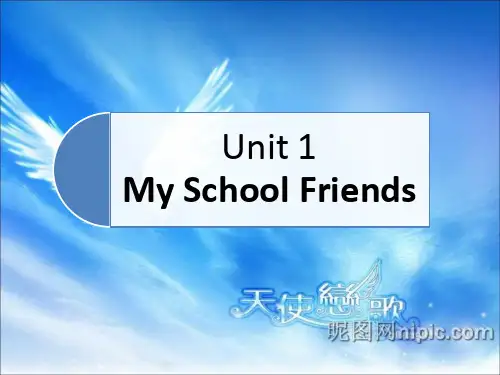
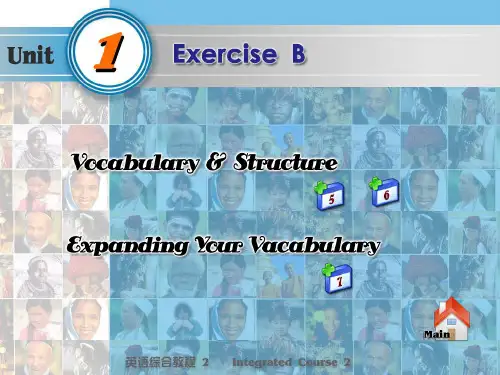

Unit1People1.Warmingup:Usingthephrases“Howdoyoudo?MynameisNicetomeetyou.”writtenontheboard.2.Focus:Thestudentsareshownpicturesofpeoplemeetingforthefirsttime.Theyarealsosuppli edwithadialoguewhichtheycancopytosaywhattheydowhentheymeetsomebodyfor thefirsttime.Theyjointheirhandsatpalmsandsmile.Theyshakehandsandsmile. Theybowfromthewaistandlowertheireyes.Askstudentsto:1)Matchnationalitieswiththepictures:whichpictureshowsanIndianwoman?WhichpicturesshowstwoJapanesewomen?WhichpictureshowstwoAmericans?Whi chpicturesshowstwoChinesemen?2)Actoutoneofthesegreetingsinclass.Theotherstudentsmustguesshowtheyaregreetingeachother.Areyoubowingfromthewaistandloweringyoureyes?Areyous hakinghandsandsmiling?3)Tellhowtheygreeteachother?Howtheygreetolderpeople?Howtheygreettheirteachers?Howtheygreettheirparentsandotherrelatives?Andactingoutthesediff erentwaysforgreetingpeople.3.TextA:greetingandintroducingpeople1)Newwordsreading2)Askstudentswhattheycanseeinthepictures,howoldtheythinkthepeopleare,whatkindofoccasionitcouldbeandiftheyhaveabarbecueathomeandwhattheybarb ecue.3)Askstudentstoreadoutthetextloudparagraphbyparagraph.Collectanywordswhichstudentshavedifficultypronouncing.Writingthesewordsontheboard.Make alistontheboard.Thenrepeatthewords.4)Askstudentsthefollowingquestions:Howtogreetanolderpersonwhenyoumeethimforthefirsttime?Doyoushakehandswithanolderperson?Doyousmileatanolderperson?Howdoyouintroduceyourselftoanolderperson?Whatdoyousaytoayoungerperson?Howdoyouintroducesomebodyelsetoayoungerperson?Whatdoyousaytosomebodyyoualreadyknow?Howdoyouanswerayoungerpersonyouknowwhogreetsyoufirst?5)PairworkasKateMillerandSungLingstartingfromline17.6)Page5-1:readoutthesentencesandthenpairthem.7)Page5-2:checkthemeaningofthewordsbeforedoing.4.Backgroundinformation:1)studentexchange:increasestudent'sunderstandingandtoleranceofotherculture s,aswellasimprovingtheirlanguageskillsandbroadentheirsocialhorizon.2)Barbecue:anoutdoormeal,usuallyaformofsocialgatheringatwhichmeats,fish,orf owl,alongwithvegetables,areroastedoverawoodorcharcoalfire.5.wordsandexpressions:1)exchangepartner2)BowTheybowedlowtothechairman.Heturnedandbowedtohisboss.BowandarrowsHetookbowonstagetoaudience.3)Next-doorneighbor4)LimpLimphandshakeSheletherwholebodygolimp.Maryhadtwistedherankleandwaslimping.一瘸一拐5)Friend--friendlyunfriend--unfriendly--unfriendliness6)Informal--informally--informality7)Shortperiod8)Formal--formally--formality9)Hadbetterdo10)Informalformalnaturalpersonalprofessionaladditionaleducationalmusicalact ualofficialregionalindustrialinternationalmedicaltraditionalculturalpracticalPage7listening1:Beforeplayingtherecordinggetstudentstoreadthesentences1to6,firstquietlytothe mselves,thenaloud.Makesurethateverybodyhasunderstoodthesentences.Nowplaytherecordingandgetstudentstodotheexercise.Bepreparedtoplaytherecor dingasoftenasthestudentsneedit.Patrick:goodmorning.Excuseme,butareyouMsSusanGarnerfromChicago,pleaseSusan:that'sright.Patrick:howdoyoudo,MsGarner?I'mPatrichChoy.It'snicetomeetyou.I'vecometota keyoutoyourhotel.Susan:howdoyoudo,MrChoy.It'snicetomeetyou,too.Look,mayiintroduceyoutoone ofmycolleagues?ThisistonyHunter.Tony,thisisPatrickChoy.He'scometotakeustoo urhotel.Tony:Fine.Howdoyoudo,MrChoy?It'sapleasuretomeetyou.Patrick:Howdoyoudo,MrHunter.WelcometoHongkong.Tony:Thankyou.I'veheardsomanygoodthingsaboutHongkongthatit'swonderfulto behere.Patrick:that'snicetohear.Now,couldyoucomethisway,please?Thecar'sjustoutsidet hebuilding.It'snotfar.Askstudentstoreadoutthesentencesandsaywhethertheyaretrueorfalse.TextB:BlindDate1.Backgroundinformation:1)Blinddate:itusuallyoccurswhenthetwopeoplepreviouslynotknowingeachotheraregoingoutonadatesetupbyanotherpersonwhoknowsbothpeople.Today,m ostblinddatesaren'ttotallyblindperse,thankstoonlinesocialsitessuchasFacebo okandMySpace,wheremanypeoplehavephotographsofthemselvesthatareea silyaccessiblebyothers.2)Geocaching地理寻宝游戏:isahightechversionofhideandseekandanoutdoorrecreationalactivity,inwh ichtheparticipantsexploretheoutdoorsinsearchofhidden“treasure”andadven turebyusingaGPSreceiverormobiledeviceandothernavigationaltechniques.2.Wordsandexpressions:1)Internetdatingsite2)Icouldnotbelievemyeyes.3)ShebeganmodellinginParisaged15.4)Glamour--glamorous5)Suit--suitable6)Allthegirlsfanciedhim.Lindatookquiteafancytohim.Whatdoyoufancydoing?Ijustfanciedadrink.7)tongue-tied8)Agenerousglassofwine一大杯酒;generosity大量充足9)Tipthewaiteradollar10)Stripedtie条纹领带11)TieupyourshoelaceItiedaknotintherope.12)ican'tstand.13)Ignore--ignorant--ignorance14)Beinnomoodfor.../todo...没心情做某事Beinthemoodfor../todo...有心情做某事Beinamood情绪不好15)misery--miserable--miserably16)Regret--regrettable--regrettably17)Straightaway马上18)Hopefully但愿19)Strikeupaconversationwithsb.搭讪攀谈strick--struck20)Beinconversationwithsb.正在谈话21)Makeconversation搭话找话说说应酬话。
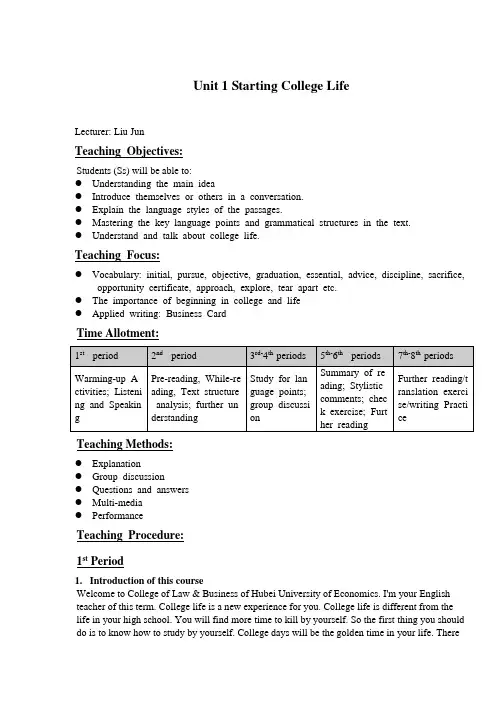
Unit 1 Starting College LifeLecturer: Liu JunTeaching Objectives:Students (Ss) will be able to:●Understanding the main idea●Introduce themselves or others in a conversation.●Explain the language styles of the passages.●Mastering the key language points and grammatical structures in the text.●Understand and talk about college life.Teaching Focus:●Vocabulary: initial, pursue, objective, graduation, essential, advice, discipline, sacrifice,opportunity certificate, approach, explore, tear apart etc.●The importance of beginning in college and life●Applied writing: Business CardTime Allotment:Teaching Methods:●Explanation●Group discussion●Questions and answers●Multi-media●PerformanceTeaching Procedure:1st Period1.Introduction of this courseWelcome to College of Law & Business of Hubei University of Economics. I'm your English teacher of this term. College life is a new experience for you. College life is different from the life in your high school. You will find more time to kill by yourself. So the first thing you should do is to know how to study by yourself. College days will be the golden time in your life. Thereis a saying, “God will help those who help themselves.” This first unit we are going to learn some tips for you to begin your college life.Introduction of This Course:Teaching objects:Students in the Vocational and Three-year CollegesTeaching ideas:Focus on applicationTeaching MaterialPractical English for Vocational CollegesClass Hours:The Term Grade Evaluation SchemeFinal Examination 60%Attendance 10%Classroom Performance 30%2.Warming-up Activities:1) Group discuss/ pair workWhen confident high school students enter college, a whole new life is in front of you, a new battlefield to conquer…Video 1: Colorful College lifeDiscuss the following questions with your partners:•Where are you from?•What are your expectations of college life?•What kind of changes do you think it will bring upon your life?Practical English for Vocational Colleges (Book 1)高职高专实用英语综合教程教案(Book 1)2) Information related.Topics of College Life•Classes•Professors/Advisors•Books•Dorm Life•Student Clubs & Organizations•Specialty•Campus Safety•Tips and Advice3.speakingWork in pairs and act the dialogues to the whole class.Task 1: Meeting with a foreign student and talking about studies, try to introduce yourself to your classmates.Tips:Glad to meet you.Where are you from?Which are you in?I’m majoring in …Task 2: Helping a foreign friend select his course at the registration officeTips:Do you know how to register for online courses?What course do you like most?4.Focus on Listening1) Word tips:Register for: to put someone’s or something’s name on an official list.e.g.: How many students have registered for English class?Credit: a unit which represents a successfully finished part of an educational course.[U] Praise, approval or honore.g.: I gave him credit for (= thought that he would have) better judgment than he showed.Credit Card: a small card which can be used as a method of payment, the money being taken from you at a later timeDorm/dormitory:Major in/at: the most important subject that a college or university student is studying.e.g.: What is your major, English or French?She was a philosophy major at an Ivy League college.2) Listening tasks:Short conversations and finish Part B and C on page 6.2nd Period1. Lead-in questions:What do you expect to learn at college?What kind of life did you expect to have before you came here?What do you expect to learn? More book knowledge or more practical social experience? Students are required to discuss the questions in pairs and then some of them were asked to report the results of the discussion.2. Intensive Reading (Text A) Pre-reading:The teacher asks the following questions:1)What’s college life like in your eyes?2)Do you think there are any differences between college and high school?3)What’s your plan for your college life?Background informationGive brief introduction of some famous universities in the U.S.3. While-reading1) Scanning and find answers to these questions as quickly as possible:1.According to the passage what kind of feeling a student will feel if he has a chance to goto college?2.What have most of you decided on when you go to college?3.Why is the initial decision very important?4.What’s the advice the author always gives to students?5.Why will it be a waste to all of the people if you limit your collegeexperience?6.How will you be exploring many of the disciplines?7.What can be established to a great extent in college?8.Is it necessary to commit yourself and stand by that commitment as you stand at theentrance of your college career?2) Intensive ReadingUnderstand the general organization of the text. Students are required to get the main idea of the text and each paragraph. (Refer to Reading Comprehension Exercise)4. Assignment1. Review the text.2. Oral passage: My ideal college life.3rd– 4th Periods1.Warming-up Activities:1)Ask some students to share their oral passage with the whole class.2)Brief review of the Reading Text A.2. Language points1) Explain the difficult words and sentences, including language and grammatical points.Practical English for Vocational Colleges (Book 1)高职高专实用英语综合教程教案(Book 1)Focus:●Experience n.经历,阅历;经验,体验E.g.-She may lack experience, but learns very quickly. 她可能经验欠缺,但学得很快- He experienced great difficulty in getting a visa to leave the country. 他申请出国签证经历了很大的困难。

Unit 4. RelationshipsLesson 11. This unit is about…Topics:➢Relationships in different situations➢Single child versus many children➢The One-Child Policy➢Problems with having siblings➢Interfering parentsSkills:➢Making up dialogues for particular situations➢Arguing for or against an issue➢Making appointments and apologizing➢Speaking: Role-play — Making appointments➢Writing: Design a T-shirt with excuses for not going to schoolWrite your own email and answer another ➢Project: A family treeTop excuses for not going to the dentist’s Grammar:➢Adverbs:Comparison of adverbs2. Focus2.1 Match dialogues a–f to the situations 1–6.First, take a look at all the 6 situations.a. A: Why do we always have to watch what my brotherand sister want to?B: Because you chose yesterday and now it is somebody else’s turn.b.A: Is this your first time here?B: No, I am a regular customer. I come every six weeks.But I had to postpone my last appointment because my sister was ill.c. A: Where were you yesterday, Brian?B: I’m sorry that I couldn’t come to school but I was ill and had to stay in bed.d. A: Why did you cancel that dentist’s appointment? B: Because I hate dentists. And I thought my toothache would go away.e. A: Why do you always make dentist’s appointments for me?B: Because you never have time; when you make an appointment you forget to go.f. A: What is the problem with being an only child?B: You never have anybody to talk to or share your problems with.2.3 Now create dialogues for these three situations:1. Your friend has just cancelled a visit to the cinemawith you (for the second time!).Example:A: Why have you cancelled our visit to the cinema again? B: I’m sorry. I forgot that I had to go to m y grandmother’s tonight.A: But that is what you always say when you do not want to dosomething with me.B: That’s not true. I only say that when I want to cancel a visit to thecinema.2. Your grandfather has just told you he will give you the money for driving lessons. However, he says that you will have to drive him to the doctor’s once a week. Example:A: Okay, I will give you the money for driving lessons butyou willhave to drive me to the doctor’s once a week.B: That’s okay. But I can’t go on Mondays, Wednesdays, Thursdaysand Fridays.A: And what is the problem on those days?B: In the mornings I have school and in the afternoons I have apart-time job in a supermarket.3. You are complaining in a shop that your MP3 player that you bought last week does not record. Unfortunately you have lost the receipt.Example:A: I bought this MP3 player last week and it doesn’t record.B: Can you show me your receipt, please?A: I seem to have lost my receipt.B: I’m very sorry b ut we cannot help you unless youshow us thereceipt.3. Text Study (Passage A)3.1 Background InformationOne-Child PolicyOfficially the Family Planning Policy, it is the population control policy of the People’s Republic of China.Key words:•population growth rate•ethnic minorities•rural families•exception•siblings•an only childexempt fromNow, since the One-Child Policy was introduced, people have been able to and required to save money moreeasily.:After the One-Child Policy was issued and implemented, gradually people found that they could save up some money much more easily than before. At the same time, people also found that they had to save more money for their unknown future because of the One-Child Policy.3.2Words and Expressionscampaign n. 运动One-Child Policy 独生子女政策delegate n. 代表do away with remove 废除sibling n. 兄弟(或姊妹)give birth to have a baby 生孩子octuplets n. 八胞胎3.3TextDifferent countries, different families — but which is better?3.3.1Explanation of important words in details1.campaign n. a systematic course of aggressive activities for some specific purpose (社会、政治)运动,活动e.g. T he candidate kicked off his campaign with a speech on t elevision.该候选人由电视演讲开始了他的竞选活动。
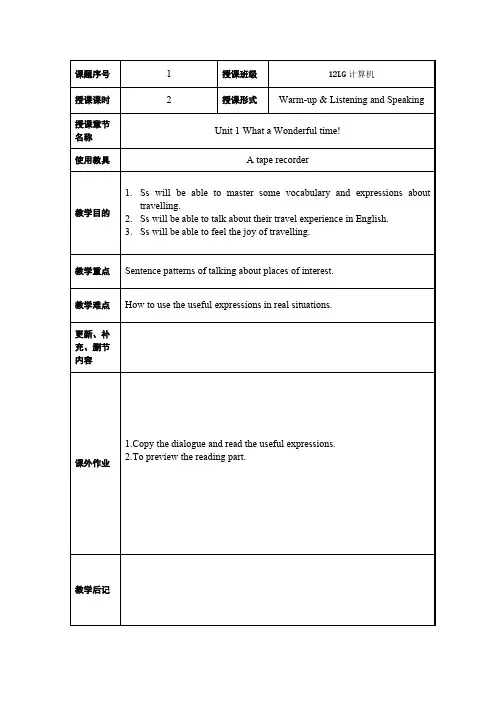
课题序号1授课班级12LG计算机授课课时2授课形式Warm-up & Listening and Speaking授课章节名称Unit 1 What a Wonderful time!使用教具 A tape recorder教学目的1.Ss will be able to master some vocabulary and expressions abouttravelling.2.Ss will be able to talk about their travel experience in English.3.Ss will be able to feel the joy of travelling.教学重点Sentence patterns of talking about places of interest.教学难点How to use the useful expressions in real situations.更新、补充、删节内容课外作业1.Copy the dialogue and read the useful expressions.2.To preview the reading part.教学后记授课主要内容或板书设计Unit 1 What a wonderful time!Listening & SpeakingPic 1: snow mountainPic 2: beachPic 3: valleyPic 4: The Roman ColosseumLanguage points:1.hear of 意为“听说,耳闻”hear from 意为“收到某人的来信”2.a bit 意为“稍微,有点儿”,用作副词,表示程度a bit of 意为“一点”,表示数量,后接名词3.be famous for 因…而出名be famous as 作为…而闻名课堂教学安排教学过程主要教学内容及步骤Step 1 Step 2Step 3GreetingsT: Happy new year, everyone! S: Happy new year!Warm-up1. Ask Ss to look at the pictures and give the correct name of each place. Check the answerPic 1: snow mountainPic 2: beachPic 3: valleyPic 4: The Roman ColosseumDiscussion: What activities can people do at each place?Pic 1: climbingPic 2: sunbath, swim, fishing, collect seashellPic 3: driftPic 4: watch games/show2. Ask students to give their reasons for traveling.Listening&speakingA1.Where did Lily probably go in the winter vacation? Tick your answer. Then listen to the conversation to check your prediction.tropical beaches2.Listen again. Then underline the sentences talking about a travel destination in the conversation.Language points1) Have you ever heard of Sanya?hear of “耳闻,听说”,hear from sb. 意为“收到某人的来信”e.g. I was shocked to hear of his death.How often do you hear from your sister?2) Could you tell me a bit about it?a bit意为“稍微,有点儿”,用作副词,表示程度;a bit of “一点”,表示数量,后接名词。
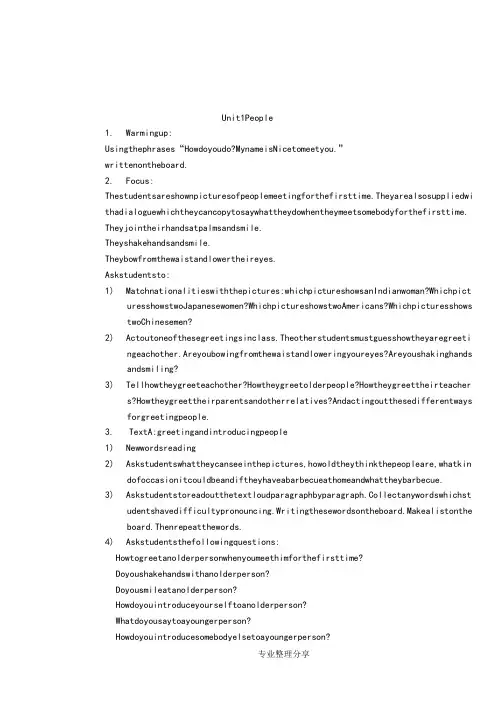
Unit1People1.Warmingup:Usingthephrases“Howdoyoudo?MynameisNicetomeetyou.”writtenontheboard.2.Focus:Thestudentsareshownpicturesofpeoplemeetingforthefirsttime.Theyarealsosuppliedwi thadialoguewhichtheycancopytosaywhattheydowhentheymeetsomebodyforthefirsttime. Theyjointheirhandsatpalmsandsmile.Theyshakehandsandsmile.Theybowfromthewaistandlowertheireyes.Askstudentsto:1)Matchnationalitieswiththepictures:whichpictureshowsanIndianwoman?WhichpicturesshowstwoJapanesewomen?WhichpictureshowstwoAmericans?Whichpicturesshows twoChinesemen?2)Actoutoneofthesegreetingsinclass.Theotherstudentsmustguesshowtheyaregreetingeachother.Areyoubowingfromthewaistandloweringyoureyes?Areyoushakinghands andsmiling?3)Tellhowtheygreeteachother?Howtheygreetolderpeople?Howtheygreettheirteachers?Howtheygreettheirparentsandotherrelatives?Andactingoutthesedifferentways forgreetingpeople.3.TextA:greetingandintroducingpeople1)Newwordsreading2)Askstudentswhattheycanseeinthepictures,howoldtheythinkthepeopleare,whatkindofoccasionitcouldbeandiftheyhaveabarbecueathomeandwhattheybarbecue.3)Askstudentstoreadoutthetextloudparagraphbyparagraph.Collectanywordswhichstudentshavedifficultypronouncing.Writingthesewordsontheboard.Makealistonthe board.Thenrepeatthewords.4)Askstudentsthefollowingquestions:Howtogreetanolderpersonwhenyoumeethimforthefirsttime?Doyoushakehandswithanolderperson?Doyousmileatanolderperson?Howdoyouintroduceyourselftoanolderperson?Whatdoyousaytoayoungerperson?Howdoyouintroducesomebodyelsetoayoungerperson?Whatdoyousaytosomebodyyoualreadyknow?Howdoyouanswerayoungerpersonyouknowwhogreetsyoufirst?5)PairworkasKateMillerandSungLingstartingfromline17.6)Page5-1:readoutthesentencesandthenpairthem.7)Page5-2:checkthemeaningofthewordsbeforedoing.4.Backgroundinformation:1)studentexchange:increasestudent'sunderstandingandtoleranceofothercultures,a swellasimprovingtheirlanguageskillsandbroadentheirsocialhorizon.2)Barbecue:anoutdoormeal,usuallyaformofsocialgatheringatwhichmeats,fish,orfow l,alongwithvegetables,areroastedoverawoodorcharcoalfire.5.wordsandexpressions:1)exchangepartner2)BowTheybowedlowtothechairman.Heturnedandbowedtohisboss.BowandarrowsHetookbowonstagetoaudience.3)Next-doorneighbor4)LimpLimphandshakeSheletherwholebodygolimp.Maryhadtwistedherankleandwaslimping.一瘸一拐5)Friend--friendlyunfriend--unfriendly--unfriendliness6)Informal--informally--informality7)Shortperiod8)Formal--formally--formality2.Introducingothers-I'dliketointroduceyouto...-thereiss omeoneI'dlikeyoutomeet,thisis...-Haveyoumet...?4.SayinggoodbyeSorry,I'mleavingnow. Sorry,I'dbettergonow. Sorry,Imustgonow. Sorry,gottogo.9) Hadbetterdo10) Informalformalnaturalpersonalprofessionaladditionaleducationalmusicalactua lofficialregionalindustrialinternationalmedicaltraditionalculturalpractical Speaking:1.1ntroducingyourself-letmeintroducemyself.Mynameis...(fullname)-Allowmeintroducemyse lf,Mynameis...(fullname)-Hello,l'm....(fullname)Tdon'tbelievewe me t .I'm....-Hi,mynameis....(firstname) -Good(morningafternoonnight …).Mynameis-^(fullname). 3.Sayinghellotosomeoneyouknow 好友见面——Hi!Hello!一般男生想约某个女生(嘿嘿这话有点儿痞)一一Howyoudoing~比较熟悉的人见面Hi/Hey 只要是朋友都能用的:How'severything?一切都好?What'sup?近况如何?What'snew?有什么新鲜事?What'shappening?在忙什么?任何时后都可以用,但比较见外:Howareyou?你好吗?适用于第一次见面:Nicetomeetyou.。

新世纪新视野高职高专英语(电子教
案)Unit1 ___
通过本教案的研究,学生将能够:
理解大学教育的重要性和价值;
研究并掌握与大学教育相关的词汇和表达;
了解大学文化和大学生活的特点;
熟悉大学选课和学术要求;
提升英语阅读、听力、口语和写作能力。
本教案的内容包括以下几个方面:
大学教育的意义和价值
大学教育对个人和社会的影响
大学教育培养的能力和素质
大学教育与职业发展的关系
大学文化与大学生活
大学的学术氛围和社交环境
大学生活的兴趣和挑战
大学生应如何适应大学生活
大学选课和学术要求
大学课程的分类和选择
大学学时、学分和学术成绩的要求大学学业的要求和规划
大学英语教育
大学英语教育的特点和目标
大学英语课程的设置和要求
大学英语研究和提高的方法
阅读和听力训练
阅读和听力的重要性和技巧
阅读和听力材料的选择和使用
阅读和听力练的方法和策略
阅读和听力练习的方法和策略。
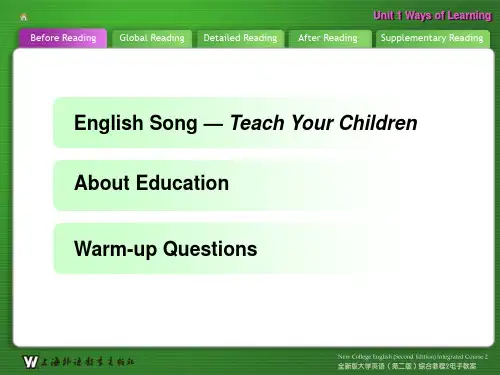

高职英语教案模板范文1. 教案基本信息•课程名称:高职英语•教案主题:单词学习•教学对象:高职院校英语专业学生•教学时长:60分钟2. 教学目标•学生能够掌握本节课所涉及的20个常用英语单词的拼写和发音•学生能够灵活运用这些单词进行日常交流3. 教学准备•教学课件:包括单词的图片、拼写和发音示例•黑板或白板、粉笔或马克笔4. 教学过程4.1 导入新知识•引入话题:请学生谈论他们最喜欢的电视节目,并让他们用英语表达自己的观点。
4.2 单词学习1.展示第一个单词的图片,并发音该单词。
然后请学生重复几次,注意发音的准确性。
同时,在黑板上写下这个单词的拼写。
2.继续展示下一个单词的图片,并重复上述步骤。
3.重复步骤1和步骤2,直到所有单词都展示完毕。
可以通过图片、示例句等多种方式帮助学生理解和记忆单词。
4.3 拓展练习•让学生自行选择一个单词,然后用英语写一个简短的句子来表达对该单词的理解或观点。
鼓励学生运用已学过的其他单词和表达方式。
4.4 总结与小结•复习本节课所学的所有单词,并检查学生对这些单词的理解和掌握程度。
•强调学生在课后需要继续巩固所学的单词,可以通过听英语歌曲、看英语电影等方式提高自己的英语水平。
5. 教学反思•教学过程中,学生积极参与了讨论,并且能够使用所学的单词表达自己的观点。
•通过图片和示例句的展示,学生更好地理解了单词的意义和用法。
•在拓展练习环节,学生能够灵活运用已学的单词来构造句子,表达自己的思想。
•教学过程中,需要注意学生对发音的准确性,及时纠正错误发音,帮助学生掌握正确的发音。
以上是一份关于高职英语教案模板范文,通过在课堂上引入话题、展示单词的图片和发音示例,鼓励学生积极参与讨论和进行拓展练习,可以帮助学生提高英语单词的学习效果。
同时,通过积极反思和调整教学方法,不断提高教学效果。
希望以上内容对您的教学工作有所帮助。
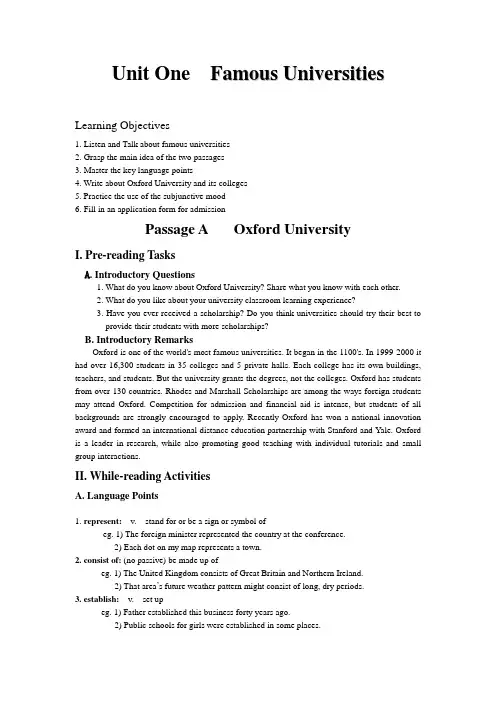
Unit One F a m o u s U n i v e r s i t i e sLearning Objectives1. Listen and Talk about famous universities2. Grasp the main idea of the two passages3. Master the key language points4. Write about Oxford University and its colleges5. Practice the use of the subjunctive mood6. Fill in an application form for admissionPassage A Oxford UniversityI. Pre-reading TasksA. Introductory Questions1. What do you know about Oxford University? Share what you know with each other.2. What do you like about your university classroom learning experience?3. Have you ever received a scholarship? Do you think universities should try their best toprovide their students with more scholarships?B. Introductory RemarksOxford is one of the world's most famous universities. It began in the 1100's. In 1999-2000 it had over 16,300 students in 35 colleges and 5 private halls. Each college has its own buildings, teachers, and students. But the university grants the degrees, not the colleges. Oxford has students from over 130 countries. Rhodes and Marshall Scholarships are among the ways foreign students may attend Oxford. Competition for admission and financial aid is intense, but students of all backgrounds are strongly encouraged to apply. Recently Oxford has won a national innovation award and formed an international distance education partnership with Stanford and Yale. Oxford is a leader in research, while also promoting good teaching with individual tutorials and small group interactions.II. While-reading ActivitiesA. Language Points1. represent: v. stand for or be a sign or symbol ofeg. 1) The foreign minister represented the country at the conference.2) Each dot on my map represents a town.2. consist of: (no passive) be made up ofeg. 1) The United Kingdom consists of Great Britain and Northern Ireland.2) That area’s future weather pattern might consist of long, dry periods.3. establish: v. set upeg. 1) Father established this business forty years ago.2) Public schools for girls were established in some places.4. distinct:adj. different, separateeg. 1) The twins had distinct personalities.2) Those two ideas are quite distinct from each other.5. property: n.1﹥land, buildings or both togethereg. 1) The statue was considered town property.2) With more and more people purchasing houses, property prices have been on the rise.2﹥the thing or things that sb ownseg. 1) The police found some stolen property in the thief’s house.6.facility:n. aids, circumstances, which make it easy to do thingseg. 1) One of the facilities our students have is a large library.2)This kitchen has a garbage disposal and other modern facilities.7. assign: v. give as a share or dutyeg. 1)They assigned me a small room.2)Two pupils were assigned to sweep the floor.8. grant: v. give (especially what is wanted or requested)eg. 1)They refused to grant them long-term credits.2)He requested that the premier grant him an interview.9. minimum: the least, or the smallest possible, quantity, number or degreeeg. 1)This price is his minimum; he refuses to lower it further.2)Allow a minimum of five minutes for introducing the dialogue.10. eligible:adj. fit, suitable, to be chosen; having the right qualificationseg. 1)Only native –born citizens are eligible for the U.S. Presidency.2)Anyone who can speak French is eligible to join the club.11. apply for/to: request sth, especially officially and in writingeg. 1)He has applied for a post in England.2)I applied to four universities and was accepted by all of them.12. restrict:v. limit; keep within limitseg. 1)The sale of alcohol is restricted in Britain.2)He was restricted by the doctor to five cigarettes a day.13. demonstrate: v. show clearly by giving proof(s) or example(s)eg. 1)The salesman demonstrated the new washing-machine to the customers.2)These figures clearly demonstrate the size of the economic problem facing thecountry.3)The fireman demonstrated great courage in saving the child.14. award:v. give as the result of an official decision, especially a prizeeg. 1)The University awarded him an honorary degree.2)The best students are awarded special scholarships.15. assess:v. judge the quality, importance or worth ofeg. 1)The value of the property has been assessed at $20,000.2)It is difficult to assess the importance of the decision.3)Examinations are not the only means of assessing students’ ability.16. at large: as a wholeeg. 1)The people at large wanted peace.2)The country at large is hoping for great changes.17. benefit from/by: gain by; receive advantage fromeg. 1)Who would be most likely to benefit from the old man’s death?2)The pupils are benefiting from the scheme.3)You will benefit by taking a holiday.18. facilitate: v. make easy or less difficulteg. 1)Modern inventions have facilitated housework.2)Zip codes are used to facilitate mail service.B. Sentence Explanation1.Each student at Oxford is assigned to a tutor, who supervises the student's program ofstudy, primarily through tutorials. (para. 4)Each Oxford student has a private supervisor who advices and instructs the student in a one-to-one basis.2. Students should check carefully that they are eligible to apply for a particular scholarshipbefore making an application as most of the schemes are restricted to certain nationalities and/or programs. (para. 7)Students should make sure that they are qualified for applying for a particular scholarship because most of the plans will only accept applicants from some specified nations and/or majors.3. In support of this aim the university will provide the facilities and support for its staff topursue innovative research by responding to developments in the intellectual environment and society at large. (para. 12)To help meet this goal the university will give financial and technical support to its teachers in their advanced scientific research for developing the academic environment and the society asa whole.III. After-reading Tasks:1. Do some exercises after the text.2. Dictation.3. Practice making sentences with the important words or expressions.Passage B “Students, You Represent OurBest Hope”I. Pre-reading TasksA. Introductory Questions1. Who have supported you on your road to college?2. Do you feel encouraged by the title “Students, You Represent Our Best Hope”3. How did you start your college journey?B. Introductory RemarksIn welcoming the new students to campus ten days after the 9-11 tragedy, the President of Stanford University encouraged them to help build a world in which such acts can never occur again. He reminded them of the help they had already received from friends, family, and others, as well as the help they would soon receive from the Stanford faculty and staff. But he encouraged them to find their own passionate sources of inspiration to develop their talents. Finally, he welcomed speech given in 1891 by Senator Leland Stanford. In that year the founder said that a university can place opportunities within a student's reach but it's up to the student to grasp and improve them.II. While-reading ActivitiesA. Language Points1.cancel: v. give up or call off (a planned activity, idea, etc.)eg. 1) She canceled her trip to New York, as she felt ill.2)They had canceled the contra t on the basis of partial payment.2.resume: v. begin again after a pauseeg. 1) We resumed our journey after a short break.2)I prepared to resume reading.3)Please resume what you were doing.3.in recognition of: in order to rewardeg. 1) Please accept this check for $30 in recognition of your service.4.tragedy:n. a terrible, unhappy, or unfortunate eventeg. 1) Their holiday ended in tragedy when their hotel caught fire.2)The accident was a terrible tragedy; they all died.5.contribute: v. give one’s share of (help, advice, money, etc.) to help a joint causeeg. 1) He didn’t contribute one idea to the discussion.2)Everyone should contribute what he or she can afford.6. dedicate: v. devote (one’s time, energy, etc.) to a noble cause or purposeeg. 1) The doctor dedicated himself to finding a cure.2)She dedicated herself to conserving our natural resources.7. transition: n. process of changing, change from one condition to anothereg. 1) Adolescence is the transition period between childhood and adulthood.2)The frequent transitions from cold to warm weather this spring have caused muchillness.8. acknowledge: v.1﹥express thanks toeg. 1) We must not fail to acknowledge his service to the town.2)Mary acknowledged the gift with a pleasant letter.2﹥agree to the truth of, recognize the fact or existence ofeg. 1) They acknowledged having been defeated.2)He acknowledged the child as his.9. urge:v. request earnestly; try to persuadeeg. 1) They urged that the library be kept open during the vacation.2)They urged the local government to approve plans for their reform program.10. passion:n. strong feeling or enthusiasmeg. 1) Mr. Smith had a genuine passion for music.2)I'm glad you have a passion for the country.11. within one's reach: the distance that one can reacheg. 1) You should choose a goal within your reach.2)I'd like to have my reference books within my reach.12. rest with: be left in the hands or charge ofeg. 1) It rests with you to propose terms.2)The final decision rests with the headmaster.13. transform: change completely in form, a rrangement, or natureeg. 1) The five years that he spent on the ship transformed him from a boy to a man.2)He transformed the kitchen into a beautiful sitting room.B. Sentence Explanation1. I have struggled with the format of this Convocation and the content of this speech forthe past 10 days. (para. 3)For the last ten days I've been thinking of the way this ceremony should be conducted and what I should say at this student gathering.2. Americans and good-hearted people of all ages throughout the world will mourn thistragedy and carry the memory of that terrible day in their hearts. (para.3)Americans and warm-hearted people all over the world, young or old, will feel sorrow for this disastrous event and remember it in a very personal way.3. I hope that you will discover a new understanding and appreciation for the pluralisticsociety in which we live and find constructive ways to contribute to the world. (para. 4)I hope you will learn the way to understand and appreciate the diversified society we live inand find your own way to offer your service.4. Let it also be a moment you remember as the initiation of your journey into the largerworld, a time when you consider your role as a citizen and what your future contribution might be. (para. 5)Also be sure to make it a special time when you start to think how you can become a more useful citizen and what you can contribute to the society in the future5. I hope you are proud of the accomplishments that have brought you to this importanttransition in your lives. (para. 8)I hope you are proud of the good things you've done to prepare for the big changes that willsoon occur in your lives.6. And I hope that you will find an intellectual pursuit that excites you and engages you somuch that it will keep you up at night and get you out of bed early, even on the weekend!(para.9)I hope you will find the academic field so exciting and engaging that you'll study it late atnight and early in the morning, even through the weekend.7. Students, I hope your time here transforms your lives, just as it has transformed the livesof so many alumni. (para. 11)Students, I hope your university life here makes you a different and a better person, just as it did so many previous students.III. After-reading Tasks1. Do some exercises after the text.2. Dictation.。
高职国际英语1u n i t1Unit 1 People1.Warming up:Using the phrases “How do you do? My name is .... Nice to meet you.”written on the board.2.Focus:The students are shown pictures of people meeting for the first time. They are also supplied with a dialogue which they can copy to say what they do when they meet somebody for the first time.They join their hands at palms and smile.They shake hands and smile.They bow from the waist and lower their eyes.Ask students to:1)Match nationalities with the pictures: which picture shows anIndian woman? Which pictures shows two Japanese women?Which picture shows two Americans? Which pictures shows twoChinese men?2)Act out one of these greetings in class. The other students mustguess how they are greeting each other. Are you bowing from the waist and lowering your eyes? Are you shaking hands and smiling?3)Tell how they greet each other? How they greet older people? Howthey greet their teachers? How they greet their parents and otherrelatives? And acting out these different ways for greeting people.3.Text A: greeting and introducing people1)New words reading2)Ask students what they can see in the pictures, how old they thinkthe people are, what kind of occasion it could be and if they have a barbecue at home and what they barbecue.3)Ask students to read out the text loud paragraph by paragraph.Collect any words which students have difficulty pronouncing.Writing these words on the board. Make a list on the board. Thenrepeat the words.4)Ask students the following questions:How to greet an older person when you meet him for the first time?精品资料Do you shake hands with an older person?Do you smile at an older person?How do you introduce yourself to an older person?What do you say to a younger person?How do you introduce somebody else to a younger person?What do you say to somebody you already know?How do you answer a younger person you know who greets you first?5)Pair work as Kate Miller and Sung Ling starting from line 17.6)Page 5-1: read out the sentences and then pair them.7)Page 5-2: check the meaning of the words before doing.4.Background information:1)student exchange: increase student’s understanding and tolerance of other cultures, as well as improving their language skills and broaden their social horizon.2)Barbecue: an outdoor meal, usually a form of social gathering at which meats, fish, or fowl, along with vegetables, are roasted over a wood or charcoal fire.5.words and expressions:1)exchange partner2)BowThey bowed low to the chairman.He turned and bowed to his boss.Bow and arrowsHe took bow on stage to audience.3)Next-door neighbor4)LimpLimp handshakeShe let her whole body go limp.Mary had twisted her ankle and was limping. 一瘸一拐5)Friend--friendly unfriend--unfriendly--unfriendliness6)Informal--informally--informality7)Short period精品资料8)Formal--formally--formality9)Had better do10)Informal formal natural personal professional additional educational musical actual official regional industrial international medical traditional cultural practical精品资料Page7 listening 1:Before playing the recording get students to read the sentences 1 to 6, first quietly to themselves, then aloud. Make sure that everybody has understood the sentences.Now play the recording and get students to do the exercise. Be prepared to play the recording as often as the students need it. Patrick: good morning. Excuse me, but are you Ms Susan Garner from Chicago, please?Susan: that’s right.Patrick: how do you do, Ms Garner? I’m Patrich Choy. It’s nice to meet you. I’ve come to take you to your hotel.Susan: how do you do, Mr Choy. It’s nice to meet you, too. Look, may i introduce you to one of my colleagues? This is tony Hunter. Tony, this is Patrick Choy. He’s come to take us to our hotel. Tony: Fine. How do you do, Mr Choy? It’s a pleasure to meet you. Patrick: How do you do, Mr Hunter. Welcome to Hongkong. Tony: Thank you. I’ve heard so many good things about Hongkong精品资料that it’s wonderful to be here.Patrick: that’s nice to hear. Now, could you come this way, please? The car’s just outside the building. It’s not far.Ask students to read out the sentences and say whether they are true or false.精品资料Text B: Blind Date1.Background information:1)Blind date: it usually occurs when the two people previously notknowing each other are going out on a date set up by another person who knows both people. Today, most blind dates are n’t totally blind per se, thanks to online social sites such as Facebook and MySpace, where many people have photographs of themselves that are easily accessible by others.2)Geocaching地理寻宝游戏: is a high tech version of hide and seekand an outdoor recreational activity, in which the participants explore the outdoors in search of hidden “treasure” and adventure by using a GPS receiver or mobile device and other navigational techniques.2.Words and expressions:1)Internet dating site2)I could not believe my eyes.3)She began modelling in Paris aged 15.4)Glamour--glamorous5)Suit--suitable6)All the girls fancied him.Linda took quite a fancy to him.What do you fancy doing?I just fancied a drink.7)tongue-tied8) A generous glass of wine一大杯酒; generosity 大量充足精品资料9)Tip the waiter a dollar10)Striped tie条纹领带11)Tie up your shoelaceI tied a knot in the rope.12)i can’t stand.13)Ignore--ignorant--ignorance14)Be in no mood for.../to do...没心情做某事Be in the mood for../to do...有心情做某事Be in a mood情绪不好15)misery--miserable--miserably16)Regret--regrettable--regrettably17)Straight away 马上18)Hopefully 但愿19)Strike up a conversation with sb.搭讪攀谈 strick--struck20)Be in conversation with sb. 正在谈话21)Make conversation 搭话找话说说应酬话精品资料精品资料。
山东海事职业学院 教 案 教师姓名 授课班级 授课形式 理论
授课日期 授课时数 授课章节名称 Unit One Company
教学目的 1. to get familiar with names of some famous companies both at home and abroad 2. to introduce yourself and a company you’ve ever stayed in 3. to grasp important new words and expressions 4. to understand tenses and voices in English grammar
教学重点 1. names of some famous companies both at home and abroad 2. important new words and expressions 3. sentence patterns in self- introduction
教学难点 1. the pronunciation of some new words and expressions 2. how to make a self introduction in order and briefly
教学步骤
1. Focus
2. Personal view- Steve jobs, the Apple Tech Titan (background information, questions before reading, new words and expressions, text analysis and discussion, exercises) 3. Grammar --- Tense and Voice
课外作业 1. to recite all important new words and expressions 2. to prepare a presentation about introducing a famous company in your hometown
教学反思 具体授课内容 Step 1: Focus To warm up before class, organize students to brainstorm following questions: 1. Can you list the names of any local companies? 2. What product do they produce? 3. Do you know any big companies both at home and aboard? 4. Where are they situated and who founded them? 5. Do you know any companies that have problems for any reason or have already gone bankrupt? Step 2: Personal view- Steve jobs, the Apple Tech Titan 1. Background Information (附课文相关背景知识,文字图片等) Stephen Gary "Steve" Wozniak (born August 11,1950), known as Woz, is an American inventor, computer engineer and who co-founded Apple Computer with Steve Jobs and Ronald Wayne. Wozniak single-handedly invented both the Apple land the Apple n computers in the 1970s. Ronald Gerald Wayne (born May 17,1934) is retired American electronics industry worker. He founded Apple Computer with Steve Jobs and Stephen Wozniak. He was the organizer of the three and got the venture off the ground. However he soon sold his share of the new company for a total of $800 in 1976, while by September 2012, Apple became the largest publicly traded corporation in the world by market capitalization, with an estimated value of US$626 billion. 2. Questions before Reading What kind of Apple product do you have? Why do you choose them instead of another brand, although Apple is much more expensive than other brands? 3. New Words and Expressions (附重点单词和词组举例讲解) tech adj. technical 技术的 titan n. a person of intellect or importance 重要人物,巨擘 technology n. knowledge or use of mechanical arts and applied sciences 技术 whiz kid 神童 consist v. be composed of 由……构成 brilliant adj. excellent 卓越的,杰出的 assemble v. fit (parts) together组装,装配 instant adj. occurring immediately即刻的 via prep. by way of 凭借,经由 vanish v. disappear 消失,消散 unexpected adj. surprising 意外的 cancer n. 癌症 executive n. a manager in a company who helps make important decisions 经理,业务主管 expectation n. anticipation 期望,预期 impressive adj. arousing respect or admiration 令人印象深刻的 aspect n. feature 方面 decade n. ten years 十年 perfectionist n. someone who is not satisfied with anything unless it is completely perfect 完美主义者 bachelor n. a man who has not yet married 单身汉 motorcycle n. a two-wheeled motor vehicle 摩托车 proof n. evidence 证据,证明 engineering n. application of science to design, building, and use of machines etc. financial adj. relating to money or the management of money财政的,金融的 salary n. fixed regular payment by employer to employee 薪金,薪水 stock n. share 股份,证券 tribute n. praise 颂词,称赞 visionary adj. having vision or foresight有眼光的,有洞察力的 creative adj. inventive, imaginative有创造力的 genius n. a very clever person 天才 inspiring adj. giving people a feeling of excitement and a desire to do something great 鼓舞人心的,启发灵感的 mentor n. teacher 导师 4. Text Analysis and Discussion
5. Exercise Step 3:Grammar 注:各单元语法安排如下 Unit 1 tenses and voices Unit 2 nominal clause Unit 4 attributive clause Unit 5 appositive clause Unit 7 adverbial clause Unit 8 subjunctive mood 说明:教师备课笔记由学校自订式样并附后